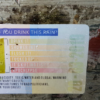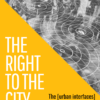Author Archive: Michiel de Lange

Guest post Alvaro Lopez about the [urban interfaces] workshop: “Who’s the Rain Today???”
The following essay was written by Alvaro Lopez, as a final reflection on the [urban interfaces] critical making workshop “The Right to the City & Urban Commons”. Thanks Alvaro! Who’s the Rain Today???: Diffractive Spaces, Tentacular Thinking and Queer Interventions in the Reimagining of Urban Interfaces Design concept: Who’s the Rain Today??? by Karoliina Haapalehto, Brian…
Read more
“From Real-Time City to Asynchronicity: Exploring the Real-Time Smart City Dashboard”
Michiel de Lange contribtued a chapter in the collection Time for Mapping: Cartographic Temporalities” (Sybille Lammes, Chris Perkins, Alex Gekker, Sam Hind, Clancy Wilmott and Daniel Evans, eds.). In this essay, de Lange pursues the idea of an ‘asynchronous smart city’ (as originally suggested by design researchers Julian Bleecker and Nicolas Nova), using the temporal…
Read more
Preview of two upcoming Open Access publications
Sneak preview: Two upcoming Open Access publications are already listed on the publisher’s websites: The Playful Citizen: Civic Engagement in a Mediatized Culture, edited by René Glas, Sybille Lammes, Michiel de Lange, Joost Raessens, and Imar de Vries (Amsterdam University press) 2) The Hackable City: Digital Media and Collaborative City Making in the Network Society, edited by Michiel de…
Read more
Critical making workshop “The Right to the City & Urban Commons”
Critical making ‘pressure cooker’ workshop “The Right to the City & Urban Commons” on 19-20 March 2019: (see also last year’s workshop >> for more background info) New technologies and datafication in so-called smart cities affect how we interface with the city. Social, economic and technological changes also lead to new urban frictions, and increasingly…
Read more
Graduate seminar session 3: The Right to the City & Urban Commons
Session 3 of the Graduate Seminar Series “The Right to the City & Urban Commons”: New technologies and datafication in so-called smart cities affect how we interface with the city. Social, economic and technological changes also lead to new urban frictions, and increasingly put strain on collectively shared urban commons and the right to the…
Read more
